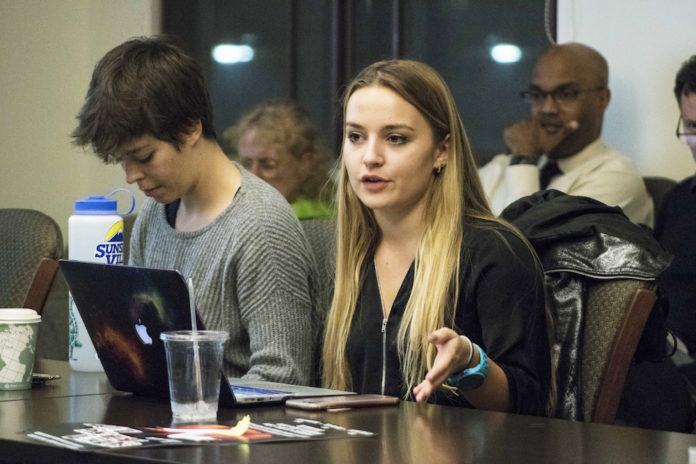
In response to COVID-19, Occidental made the decision to transition classes online and move most students off campus March 20. Associated Students of Occidental College (ASOC) president Nina Srdić Hadži-Nešić (junior) remains on campus, working with the school to provide students support for the remainder of the semester, including advocating for on-campus housing for many students, providing funding for unexpected travel expenses and allocating partial refunds for room and board.
Srdić Hadži-Nešić said that her first priority was addressing housing and move-out costs for students who needed somewhere to go when it first became clear that Occidental would be transitioning online for the semester.
“As soon as the decision broke out, I became part of the COVID-19 Task Force where I serve as a student representative, so I was involved in all the immediate conversation,” Srdić Hadži-Nešić said. “My initial instinct was to focus first on those urgent issues.”
According to Srdić Hadži-Nešić, one of the first official measures the school enacted was opening an application for students who needed on-campus housing. After some students who needed housing were denied, ASOC was able to work with Residential Education & Housing Services to reverse decisions on a case-by-case basis, according to Srdić Hadži-Nešić.
“Some people got denied who didn’t really disclose the full extent of their situation because they were concerned about privacy and so on, so they reached out to us as ASOC and we advocated for them to ensure those who got denied and really needed to stay were able to,” Srdić Hadži-Nešić said. “I do believe we have successfully advocated for all those, and then people were housed.”
Kitty Lu (junior), ASOC Senate vice president of finance, said one of her biggest priorities was to use the remaining ASOC budget for the year to help students.
“It was like, ‘Okay, we have this budget left, obviously there’s gonna be no more school events so this money is just going to sit here, so what can we use it for?’” Lu said.
Lu said that although the school was able to offer a $300 grant to students for travel and moving costs, ASOC was concerned that would not be enough for high-need students. ASOC was able to provide an additional $350 for students designated as high-need by the financial aid office through the establishment of the ASOC emergency fund, according to Lu.
“What I’m most proud of is convincing the college to financially support students with the move out,” Srdić Hadži-Nešić said.
Lu said ASOC is now focused on working with the college to expand work study payments.
“Right now, because of the recent announcement about work study, we’re working to see how we can raise that cap because there are a lot of students [for whom] $775 is not sufficient,” Lu said.
According to Srdić Hadži-Nešić, ASOC funded these programs with ASOC savings because there is so much competition for school funding during the crisis.
“Because of the many responsibilities the college has to balance, it proved true that the financial decisions related to reimbursements and credits and work study for students would take the most time and patience to figure out,” Srdić Hadži-Nešić said.
Lu said ASOC savings are meant for cases like these.
“This is what savings are for: emergencies,” Lu said. “We’re trying our best to make the best of what we have.”
These COVID-19 response measures are being implemented as ASOC representatives also prepare to draft a new constitution that would restructure student government at Occidental, according to Linda Schraeder, ASOC finance manager. Under the new constitution, ASOC would be governed by an executive board, which would have elected chairs for all ASOC branches.
Srdić Hadži-Nešić said the constitution would bring about long-term structural change in the way ASOC functions and would allow joint ownership of ASOC savings, which are largely controlled by Senate under the current constitution.
“We are trying to institutionalize horizontal leadership to better function as ASOC and better serve students by ensuring equal power of all branches and equal participation in decision-making,” Srdić Hadži-Nešić said via text.
Srdić Hadži-Nešić said the situation has brought out the best in many students but has also been very challenging for ASOC representatives and others who have taken on support roles.
“Students had to step up and emotionally support other students, which is beautiful and wonderful but also, as students, we did have to perform a lot of labor that should have been done by specific administrative offices,” Srdić Hadži-Nešić said.
![]()



































